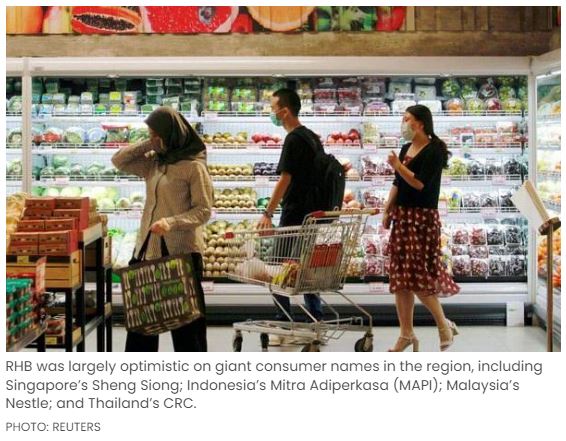Strong pricing power is king amid inflation; Singapore, Indonesia emerge regional winners: RHB
COMPANIES with strong pricing power will have much to gain from the inflationary environment as these players tend to have more stable profit margins when dealing with cost pressures.
Singapore and Indonesia are believed to be among the biggest winners in the region, as RHB in its report on Thursday (Sep 15) forecast 3.2 per cent and 5 per cent gross domestic product growth in 2022 and maintained its “overweight” call on both countries.
Inflation represents a time where consumers find their purchasing powers continuously eroded. This in turn compels people to be more selective with their spending by prioritising the essential goods and/or down-trading to lower-priced alternatives to stretch their dollar.
Demand inelastic goods, which in RHB’s opinion include staple foods, addictive products such as beer and cigarettes, and luxury items, could stand to benefit from its ability to pass on rising costs. This is particularly true for companies with sizeable market shares, who can take advantage of their greater economies of scale to lead the industry with price raises, which are often followed suit by the rest of the players.
The research house is therefore largely optimistic on giant consumer names in the region, including Singapore’s Sheng Siong, Kimly and Food Empire; Indonesia’s Mitra Adiperkasa (MAPI) and Indofood CBP; Malaysia’s Nestle, QL Resources, Farm Fresh and Power Root; and Thailand’s Central Retail Corporation (CRC).
However, given the higher interest rates and borrowing costs, inflationary pressures could also weigh on companies with high leverage.
RHB was therefore particularly cautious on some of Thailand’s large capitalisation retailers, such as Berli Jucker, Central Pattana, Charoen Pokphand Foods and CRC, which it noted all have high gearing levels of over 100 per cent due to loans incurred for massive business expansions and major acquisitions. Thailand is also projected to record the highest inflation rate at 6.2 per cent in FY2022.
Besides inflationary headwinds, investors should also look out for foreign exchange risks within regional players, as most of Asean’s currencies have depreciated against the US dollar of late.
The effect of foreign exchange is a mixed bag. Those with particularly high exposures to the US dollar, such as ACE Hardware Indonesia, Erajaya Swasembada and MAPI, are likely to be hurt as the cost of raw materials rises against a weaker rupiah.
For Thailand and Indonesia, RHB expects the weakening of local currencies against the US dollar to benefit export volumes.
Singapore however is unique, given that most of its consumer names under RHB’s coverage have a local cost base. Analysts thus believe the effect of forex is negligible on the city-state.
Given its stronger denomination as compared to a weaker South-east Asia currency, consumer plays also stand to benefit as the majority of food imports are from the South-east Asian/Asian region, said the research house.
“By and large, our economists expect inflation across Asean to peak in Q3, with the balance of risks skewed towards delays till end-2022 to early 2023 due to uncertainties on global supply chain congestions and commodity prices,” said RHB’s analysts.
The overall top 10 stocks selected under its regional coverage thus include: Indofood CBP, Mayora Indah, MAPI, Heineken Malaysia, Mr DIY, Padini, Sheng Siong, Food Empire, CRC, Berli Jucker and Minor International.
Source: https://www.businesstimes.com.sg/asean-business/strong-pricing-power-is-king-amid-inflation-singapore-indonesia-emerge-regional


 English
English




